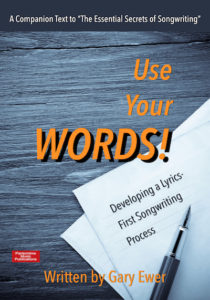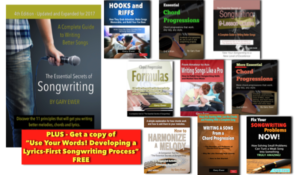I wrote recently about the difference between theory and practice (“What’s Most Important: Theory or Practice?“) The best songwriters are the ones that know a bit of the theory behind what they do, and then spend a good amount of time “practicing” their art.
The practical side of songwriting is the actual doing side. In pop songwriting, I believe your best ideas often come from spontaneous improvisation. But other than simply letting ideas run wild, is there a “smart” way to improvise?
 The FREE DEAL continues… Get “Use Your Words!” free with your purchase of “The Essential Secrets of Songwriting 10-eBook Bundle”, and learn how to develop a lyrics-first songwriting process.
The FREE DEAL continues… Get “Use Your Words!” free with your purchase of “The Essential Secrets of Songwriting 10-eBook Bundle”, and learn how to develop a lyrics-first songwriting process.
Here are a few things you can try. Most of these ideas can be tried on your own, assuming you’ve got the technical ability and equipment at your disposal to loop musical fragments while you come up with new ideas.
Or you can try them with a songwriting partner. Be sure to record your efforts, in case you come up with something truly usable in your next song:
- Melody and lyrics. Improvise a short, catchy group of words that might serve as a song lyric, and then start inventing different melodies that bring them to life. Example: “Taking all my dreams and throwing them away…” Start simple: sing that line to a made-up melody that dwells mainly on one or two notes. Then do it again and again, changing the melody each time.Try some words at the top of the melody, then change it up and sing a melody where those same words appear at the bottom. At first it may seem difficult, giving you mostly garbage. But as you work you’ll find that things get better.
- Sequence some chord progressions. Choose a key (A minor, let’s say). Now, create a 3-chord progression, something like: Am F Am. Now transpose it a 3rd higher: C Am C. Now another 3rd higher: Em C Em. As you transpose it one more time, do something that allows it to move back to the Am chord easily: F C G (..Am). When you do that, it’s called sequencing. It’s a way of taking a short chord idea and getting some mileage out of it.
- Invent a melody and change the chords that support it. Play a simple 2- or 3-chord progression (C Dm C) and create a catchy rhythmic accompaniment with it. Now sing a short melody that sits on top of the chords. Once you’ve done that, switch your attention to the chords you’re using, and start substituting chords. Here are some chords that might work as substitutes for C-Dm-C: C-F-C, Am-Dm-Am, Am-Dm-C, C-Dm-Am, etc.
- Focus on the bass. Set up a rhythm on your computer or sequencer, then start improvising a bass line. Those bass notes will, of course, imply chords, so each time you change your line, the implied chords also change. This idea makes it more likely that your bass line will be interestingly contoured, or at least in some way a point of focus.
- Bounce ideas off of a songwriting partner. It can be a lot of fun to bounce lyrical ideas off another songwriter. There are any number of ways to do this, but try this one: Create (ahead of time) a list of short lyrical phrases (“The sun on my shoulder..”). When you’ve got a good list (ten or more), sit facing your songwriting partner, create a rhythm, either electronically, or simply by slapping/tapping. One person says the phrase, and the other one answers it immediately with something they make up on the spur of the moment: “The sun on my shoulder..”/”Makes me feel older” (“But still feeling colder..“, “And a dream that I sold her..”).
Most of these ideas will be fun, but you may find that they’re not giving you a lot of usable material. That’s OK — at some point, you’ll hit on something that has promise, something that you might fashion into a hook or a verse idea.
And remember, these kinds of improvising activities or only one possible way to write songs. There are lots of other processes to try. The more activities you have at your disposal, the more ideas you’ll have to try when writer’s block grips.
 Written by Gary Ewer. Follow Gary on Twitter.
Written by Gary Ewer. Follow Gary on Twitter.
 Get “The Essential Secrets of Songwriting” eBooks. They’ll help you polish your technique, and make you the best songwriter you can be. Comes with a Study Guide, tons of chord progressions, and information covering every aspect of how to write good music.
Get “The Essential Secrets of Songwriting” eBooks. They’ll help you polish your technique, and make you the best songwriter you can be. Comes with a Study Guide, tons of chord progressions, and information covering every aspect of how to write good music.










